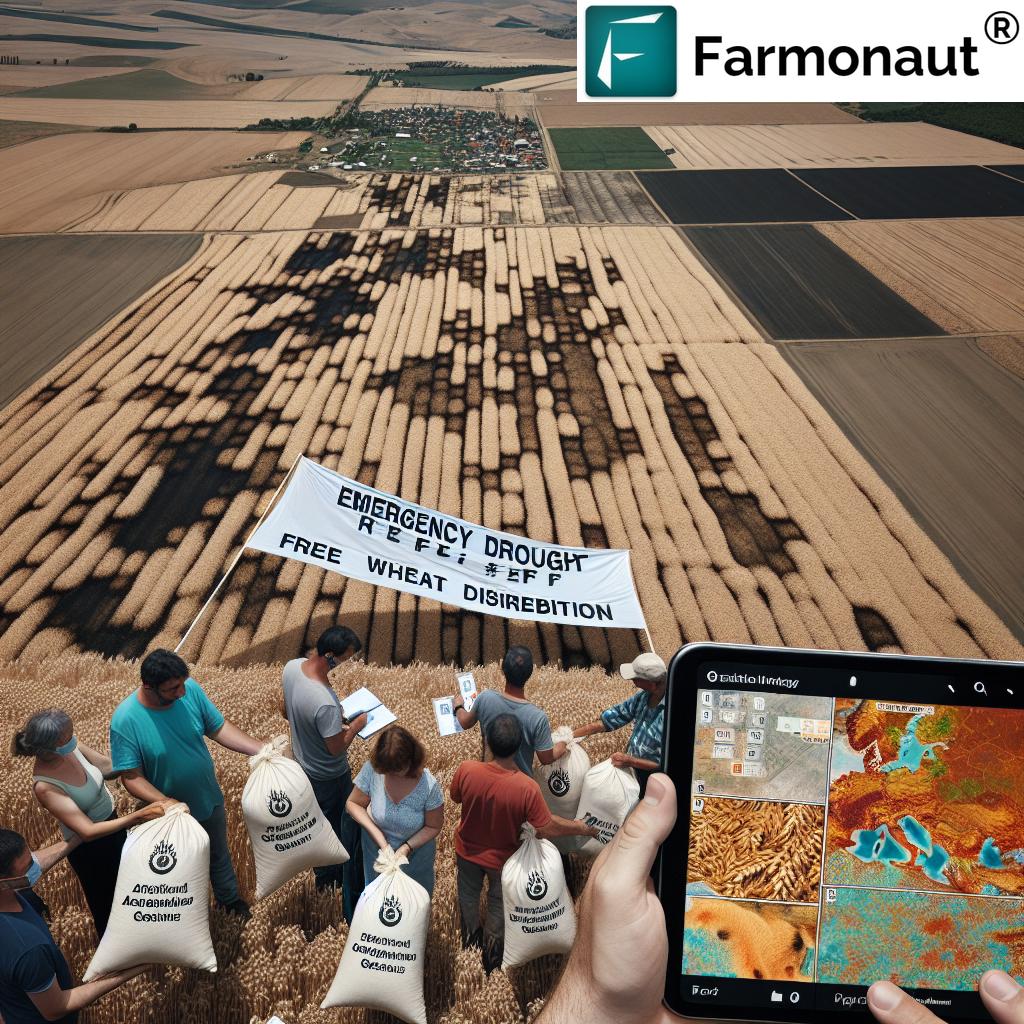Urgent Relief: Moldova Launches Powerful Drought Aid Program with Free Wheat Seeds for Struggling Farmers

In a significant move to combat the devastating effects of drought on its agricultural sector, Moldova has launched a comprehensive drought relief for farmers program. The centerpiece of this initiative is a free wheat seed distribution effort, aimed at providing crucial support to farmers whose crops have been severely impacted by the recent dry spell.
Moldova Drought Relief for Farmers: A Timely Response
The Moldovan government, in collaboration with the Food and Agriculture Organization (FAO) of the United Nations, initiated this emergency agricultural assistance on October 16. This program is a direct response to the severe drought that has plagued the country, causing widespread crop failures and threatening the livelihoods of countless farmers.
- The program offers aid to farmers whose wheat crops suffered over 70% damage
- Eligible farmers can apply through their local agricultural departments
- This initiative is part of the FAO drought recovery project Moldova
The timing of this program is crucial, as it allows farmers to prepare for the upcoming planting season with renewed hope and resources. By providing drought-resistant wheat seeds, the program not only offers immediate relief but also sets the stage for more resilient agricultural practices in the face of climate change.
Free Wheat Seed Distribution Program: A Closer Look
The free wheat seed distribution program is designed to provide tailored support based on the extent of crop damage experienced by each farmer. This approach ensures that those most affected receive the most substantial aid.

Key features of the program include:
- Varying levels of support based on crop loss percentages
- A maximum allocation of 8,000 kg of wheat seeds per farmer
- Distribution of high-quality, drought-resistant wheat seeds
- Integration with broader sustainable farming practices
This Moldovan farmer aid for crop losses is not just about immediate relief; it’s a strategic move towards enhancing the resilience of the country’s agricultural sector. By introducing drought-resistant varieties, the program aims to better prepare farmers for future climate challenges.
FAO’s Role in the Drought Recovery Project Moldova
The FAO’s involvement in this agricultural disaster assistance program is substantial and multifaceted. Their commitment of 400 tons of wheat seed underscores the scale and importance of this initiative.
The FAO emergency project in Moldova encompasses:
- Provision of high-quality, drought-resistant wheat seeds
- Technical assistance and training for farmers
- Support in implementing sustainable farming practices
- Monitoring and evaluation of the program’s impact
This comprehensive approach ensures that the farmer aid program goes beyond mere distribution of seeds. It aims to equip Moldovan farmers with the knowledge and tools necessary for long-term success in the face of changing climate conditions.
Climate Change Adaptation in Moldovan Agriculture
The free wheat seed distribution program is a crucial step in Moldova’s broader strategy for climate change agriculture adaptation. As extreme weather events become more frequent, the need for resilient farming practices becomes increasingly urgent.
Key aspects of climate change adaptation in this context include:
- Introduction of drought-tolerant crop varieties
- Promotion of water-efficient irrigation techniques
- Soil conservation practices to retain moisture
- Diversification of crops to spread risk
By focusing on these areas, Moldova is taking proactive steps to safeguard its agricultural sector against future climate-related challenges. The drought-resistant wheat seed support program is a cornerstone of this adaptive approach.
Impact on Food Security and Economic Stability
The ripple effects of this crop loss compensation program extend far beyond individual farms. By ensuring continued wheat production, Moldova is taking crucial steps to maintain its food security and economic stability.
Expected outcomes of the program include:
- Stabilization of wheat production in the short term
- Enhanced resilience of the agricultural sector in the long term
- Improved food security for the Moldovan population
- Economic support for rural communities heavily dependent on agriculture
These outcomes highlight the critical importance of Moldovan agriculture support in maintaining the country’s overall economic health and food independence.
Technological Integration in Drought Management
While the free seed distribution is a crucial immediate step, long-term drought management in Moldova will increasingly rely on technological solutions. Platforms like Farmonaut offer innovative tools for farmers to monitor crop health, soil moisture, and weather patterns.
Key technological advancements include:
- Satellite-based crop monitoring
- Precision agriculture techniques
- Weather forecasting and early warning systems
- Smart irrigation systems
These technologies complement the seed distribution program by providing farmers with real-time data and insights, enabling more informed decision-making in the face of climate variability.
Looking Ahead: Sustainable Farming Practices in Moldova
As Moldova moves forward with its drought relief for farmers program, there’s an increasing focus on integrating sustainable farming practices into the broader agricultural strategy. This approach not only addresses immediate needs but also lays the groundwork for a more resilient and environmentally friendly agricultural sector.
Key sustainable practices being promoted include:
- Crop rotation to improve soil health
- Conservation tillage to reduce soil erosion
- Integrated pest management to reduce chemical use
- Agroforestry to improve land use efficiency
By embracing these practices, Moldovan farmers can not only better withstand future droughts but also contribute to the overall health of their land and the environment.
Conclusion: A Step Towards Resilient Agriculture
The launch of this powerful drought aid program in Moldova marks a significant milestone in the country’s approach to agricultural disaster management. By providing free wheat seed distribution and focusing on drought-resistant wheat seeds, Moldova is not just offering immediate crop loss compensation but is paving the way for a more resilient and sustainable agricultural future.
As climate change continues to pose challenges to agriculture worldwide, initiatives like this farmer aid program serve as crucial models for adaptation and resilience. The collaboration between the Moldovan government, international organizations like FAO, and the farming community demonstrates the power of collective action in addressing complex environmental challenges.
For farmers looking to complement these efforts with technological solutions, tools like the Farmonaut app can provide valuable insights for crop management and drought mitigation.
As Moldova moves forward with this initiative, it sets an example for other nations grappling with similar climate-related agricultural challenges. The success of this program could pave the way for more comprehensive and innovative approaches to climate change agriculture adaptation globally.
For more information on how satellite technology can aid in agricultural management, visit the Farmonaut Satellite API or check out the API Developer Docs.

